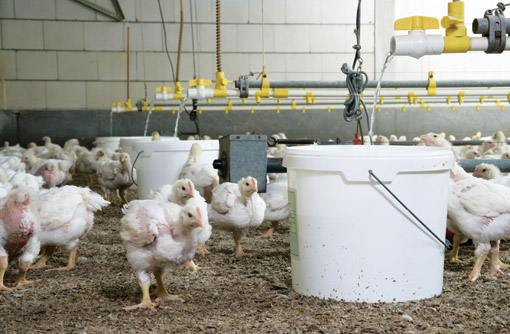Reducing antibiotic use is top priority for poultry keepers

Britain’s poultry industry needs to carry out a critical assessment of its management practices or face tough legislation from Europe over the use of antibiotics.
Poultry vet Keith Warner of Minster Veterinary Practice said voluntary efforts to drive down antibiotic use were vital if the industry was to stave off EU attempts to introduce stringent mandatory measures over human health concerns.
Speaking to the East Midlands Poultry Group, Mr Warner said producers had turned to antibiotics too readily rather than thinking about the reasons why their livestock were showing signs of illness.
Instead they needed to take a more holistic approach to production and look to alternatives before immediately using antibiotics.
“We need to reduce use until they are really necessary,” he told producers and industry representatives. “There are times that we have used them where they are not to protect against disease.”
Mr Warner said intensive agriculture had been able to develop because of antibiotics, allowing producers to increase stocking densities and cope with management deficiencies as they learned how to manage birds.
But he said they have been increasingly used as a solution to problems which could be solved through better management of birds’ environment.
“When you look at how we cope with systems and problems, antibiotics are the cheapest option as they are predictable. We can manage the outcome and they are easy to obtain and use,” he said.
“But they are often used to treat problems that are exacerbated by poor management such as poor hygiene, drafts and enteritis issues.
“If we want to drive down use we need to critically assess all management and all the things we have come to see as routine.”
Mr Warner said producers needed to learn to recognise issues and learn to work around them by using the expertise available to them from vets and nutritionists.
“Lots of signs are taken to be indicative of enteritis, such as wheat flicking and wet litter, but it’s not always the reason and antibiotics aren’t always needed.
“We get into routines of using antibiotics at certain times and assume if we don’t use them then all hell will break loose, but that’s not always the case.”
Producers needed to look at the whole breeding pyramid and life-cycle of birds to maximise good health, he added. “Antibiotics are necessary and we will do all we can to drive for continued use.
“But antibiotic use will be reduced if we don’t change our behaviour, management, health planning and reactions to what we do when we see changes onsite.”
What are the alternatives to antibiotics?
Autogenous vaccines: Specific vaccines for a problem on a site. Expensive to justify for broilers, but could be viable for turkeys and layers.
Nutraceuticals: Herbal products such as garlic and onion which can improve general bird health
Organic acid products: Organic acid maintains good gut health by helping create the right gut environment and bacteria. Good gut health reduces E coli infections.
Improving management to reduce antibiotic use
Following the idea of “seed, feed and weed” should help producers ensure good health within their flock.
“The ‘seed’ element refers to putting in the correct bacteria in the first place to drive the growth and create a healthy gut, such as a probiotic,” said Mr Warner.
In terms of “feed”, ensuring the right nutrition is available to birds at the right time is vital. “You need to look at the bodyweight of birds and make a decision on what they should be fed.
“Stress is an enormous factor and can be hard to pin down, but feeding the wrong feed at the wrong stage will create huge stress and cause problems such as low production.”
The “weed” element involves parasitic control, which will have an impact on the hardiness of breeds, he added. “It is better to have a system in place where we can check and react to parasites rather than give a general treatment.
“The importance of biosecurity should not be underestimated either and there are practical things that can be achieved with minimum cost,” he said. “Take a critical look at your clean-out regime, from the cleanliness of keyes trays and water hygiene to egg collection lorries and control rooms.
“Also think about whether you are rearing the right birds for your production environment, as some can cope better than others.
“Thinking about whether your environment is optimised is important too. Are you creating drafts which affect quality, is the bedding comfortable and warm, are you promoting ranging to allow natural foraging and decrease bullying? These can all help.”
